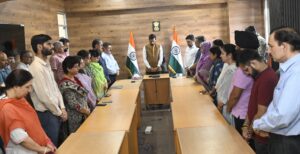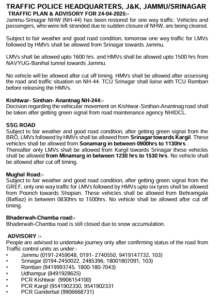J&K Govt takes action for better land, soil management with launch of pioneering project
JAMMU, February 10: Jammu and Kashmir government has approved an ambitious project envisaging creation a comprehensive soil and land resource information system.
The project, titled ‘J&K Soil and Land Resource Information (JKSLRI)’ system, has been designed to help in decision-making for sustainable use of soil and land resources in the region, which is being considered as ecologically fragile.With its goal of providing a scientific base for crop diversification and soil suitability, the JKSLRI project is set to revolutionize the way we approach land use and soil management in the region.
“The problem of unscientific land conversions and poor soil health management practices has been causing a decline in soil health, leading to poor outputs and even enterprise failure. There is also lack of knowledge and poor extension on soil health management, which is leading to loss of soil biodiversity due to intense cultivation and soil pollution.”, said Atal Dulloo, Additional Chief Secretary, Agriculture Production Department.
He further said that the JKSLRI project has been designed to provide the most comprehensive and up-to-date information on soil and land resources, making it an essential tool for decision-making when it comes to sustainable use of soil and land resources.
The prestigious project, which will initially be started in four districts of J&K, has several objectives including creation of a robust land use policy on agriculture and urbanization, crop-land suitability based on land evaluation, capacity building of farmers and other stakeholders on soil health management besides establishment of one static and 25 mini soil testing laboratories in each selected district.
The project has been designed to have a major impact on the region including creation of an authentic soil and land resource repository with two soil museums one each at Jammu and Srinagar. The project shall also provide support for efficient use of fertilizers and micro-nutrients, which is important for organic production systems.
These objectives will help lay the foundation for a robust land use policy on agriculture and urbanization, ensuring that the region remains sustainable and ecologically sound for generations to come.
“Developing J&K Soil and Land Resource Information (JKSLRI) system for Planning and Soil Health Management” is one among the 29 projects, which were approved by the Jammu and Kashmir administration after being recommended by the UT Level Apex Committee for holistic development of agriculture and allied sectors in UT of J&K. The prestigious committee is being headed by Dr Mangala Rai, Former DG ICAR and has other luminaries in the field of Agriculture, Planning, Statistics and Administration like Ashok Dalwai, CEO NRAA, Dr. P. K Joshi, Secretary, NAAS, Dr. Prabhat Kumar, Horticulture Commissioner MOA and FW, Dr. H S Gupta, Former Director, IARI, Atal Dulloo, ACS, APD besides Vice Chancellors of twin Agriculture Universities of the UT.
The project will be executed in several phases, starting with intensive soil survey, soil sampling and analysis followed by ground truthing and data analysis. It will also include collection of soil monoliths and analysis of soil, water and plant samples. These interventions will result in generation of data at panchayat level, intensive soil mapping, creation of a web-based soil information system and land evaluation for crop suitability and alternate land use.
The JKSLRI project is expected to have a significant impact on the region by providing the most comprehensive and up-to-date information on soil and land resources. It will create an authentic soil and land resource repository and make information accessible to all. The policy document on agriculture and urbanization will ensure a sustainable ecosystem for generations to come, while the efficient use of fertilizers and micro-nutrients will lay the foundation for organic production.
This project is not only crucial for food security and achieving Sustainable Development Goals but also a testament to the government’s commitment towards deploying cutting edge and future-ready technologies in the agriculture sector. The project will have far-reaching benefits for farmers, researchers, natural resource managers and other stakeholders in the region.





